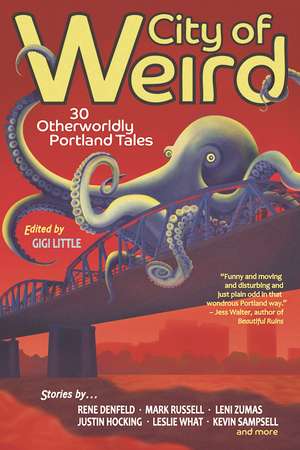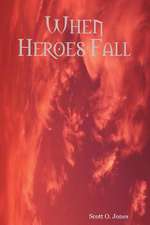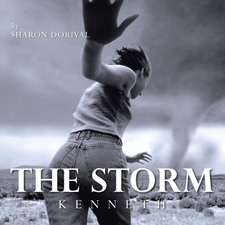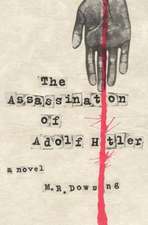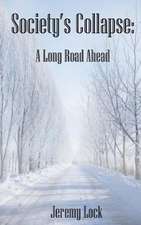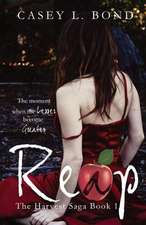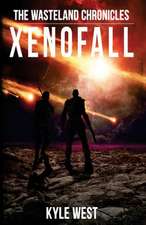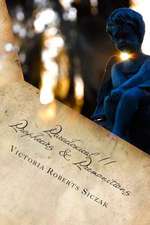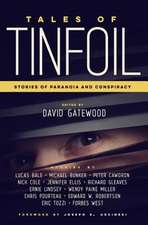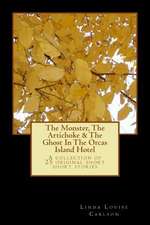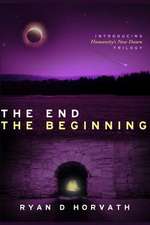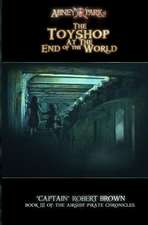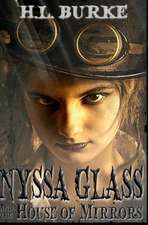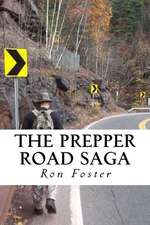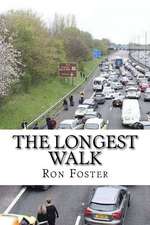City of Weird: 30 Otherworldly Portland Tales
Editat de Gigi Littleen Limba Engleză Paperback – 11 oct 2016
City of Weird conjures what we fear: death, darkness, ghosts. Hungry sea monsters and alien slime molds. Blood drinkers and game show hosts. Set in Portland, Oregon, these thirty stories blend imagination, literary writing, and pop culture into a cohesive weirdness that honors the city’s personality, its bookstores and bridges and solo volcano, as well as the tradition of sci-fi pulp magazines. Including such authors as Rene Denfeld, Justin Hocking, Leni Zumas, and Kevin Sampsell, editor Gigi Little has curated a collection that is quirky, chilling, often profound—and always perfectly weird.
Preț: 99.99 lei
Nou
Puncte Express: 150
Preț estimativ în valută:
19.14€ • 19.83$ • 15.97£
19.14€ • 19.83$ • 15.97£
Carte tipărită la comandă
Livrare economică 21 martie-04 aprilie
Preluare comenzi: 021 569.72.76
Specificații
ISBN-13: 9781942436232
ISBN-10: 1942436238
Pagini: 312
Dimensiuni: 152 x 229 mm
Greutate: 0.43 kg
Editura: Forest Avenue Press
Colecția Forest Avenue Press
ISBN-10: 1942436238
Pagini: 312
Dimensiuni: 152 x 229 mm
Greutate: 0.43 kg
Editura: Forest Avenue Press
Colecția Forest Avenue Press
Cuprins
Introduction from the Editor
FROM THE DEEP
The Sturgeon Queen
Rene Denfeld / 9
Octopocalypse: a Love Story
Brigitte Winter / 15
Orca Culture
Leigh Anne Kranz / 27
FROM THE SKIES
Transformation
Dan DeWeese / 34
How I Got this Job
Brian Reid / 43
A Sky So Blue
Stefanie Freele / 49
Alder Underground
Jonah Barrett / 53
How Do You Say
Gentrification in Martian
Jonathan Hill / 74
TO THE DOGS
A Code for Everything
Andrew Stark / 80
Yay
Bradley K. Rosen / 85
Out of Order
Kevin Meyer / 99
IN THE BOOKS
Aromageddon
Jason Squamata / 120
The Mind-Body Problem
Susan DeFreitas / 126
The Color Off the Shelf
Karen Munro / 141
OF THE DEAD
This Many Lost Things
Nicole Rosevear / 158
Squatty and Weasel Boy
Doug Chase / 165
Stone Cold Monk
Linda Rand / 181
The Heft of Ashes
Kirsten Larson / 183
OF THE UNDEAD
Vampire
Justin Hocking / 196
The Fixer: a Serial - 1 - The Duchess
Sean Davis / 198
The Deflowering
Suzy Vitello / 208
Trainwreck
Leslie What / 222
INTO THE WEIRD
Tunnels
Leni Zumas / 236
Waiting for the Question
Art Edwards / 241
Letters to The Oregonian
in the Year 30,000 BC
Mark Russell / 249
In Transit
Kevin Sampsell / 253
NO RETURN
Notes from the Underground City
Stevan Allred / 260
Queen of Tabor
B. Frayn Masters / 275
Twin Carbs on Bad News
Jeff Johnson / 280
Always
Adam Strong / 297
Editor Bio / 302
Contributor Bios / 303
FROM THE DEEP
The Sturgeon Queen
Rene Denfeld / 9
Octopocalypse: a Love Story
Brigitte Winter / 15
Orca Culture
Leigh Anne Kranz / 27
FROM THE SKIES
Transformation
Dan DeWeese / 34
How I Got this Job
Brian Reid / 43
A Sky So Blue
Stefanie Freele / 49
Alder Underground
Jonah Barrett / 53
How Do You Say
Gentrification in Martian
Jonathan Hill / 74
TO THE DOGS
A Code for Everything
Andrew Stark / 80
Yay
Bradley K. Rosen / 85
Out of Order
Kevin Meyer / 99
IN THE BOOKS
Aromageddon
Jason Squamata / 120
The Mind-Body Problem
Susan DeFreitas / 126
The Color Off the Shelf
Karen Munro / 141
OF THE DEAD
This Many Lost Things
Nicole Rosevear / 158
Squatty and Weasel Boy
Doug Chase / 165
Stone Cold Monk
Linda Rand / 181
The Heft of Ashes
Kirsten Larson / 183
OF THE UNDEAD
Vampire
Justin Hocking / 196
The Fixer: a Serial - 1 - The Duchess
Sean Davis / 198
The Deflowering
Suzy Vitello / 208
Trainwreck
Leslie What / 222
INTO THE WEIRD
Tunnels
Leni Zumas / 236
Waiting for the Question
Art Edwards / 241
Letters to The Oregonian
in the Year 30,000 BC
Mark Russell / 249
In Transit
Kevin Sampsell / 253
NO RETURN
Notes from the Underground City
Stevan Allred / 260
Queen of Tabor
B. Frayn Masters / 275
Twin Carbs on Bad News
Jeff Johnson / 280
Always
Adam Strong / 297
Editor Bio / 302
Contributor Bios / 303
Recenzii
"If weird makes you think of funny and moving and disturbing and just plain odd in that wondrous Portland way, well, City of Weird is the book for you."
– Jess Walter, author of Beautiful Ruins
"City of Weird is a dark, imaginative and entertaining exploration of the bizarre, set against the backdrop of Bridgetown. From the career troubles of the undead to what's lurking in the basement at Powell's, this book is perfect for readers who want to know what truly keeps Portland weird."
– Ian Doescher, Portland native and author of the William Shakespeare's Star Wars series
"Forget everything you know or think you know about Portland—all that twee Wes Anderson-y Portlandia crap—this is Portland re-imagined as exactly what it is: one more screen on which to project the American Nightmare."
– Ben Loory, author of Stories for Nighttime and Some for the Day
"With work ranging from myths to folklore, science fiction and a surprising dark comedy of eco-feminist post-Fukushima revenge, Gigi Little has collected together a brilliant showcase of literary talent working in the Pacific Northwest."
– Monica Drake, author of Clown Girl
"City of Weird is everything I love about Portland: its next-gen sensibility, gleeful disregard for expectation, and that undercurrent of darkness which acts as foil to the eccentricity. I popped these stories like the handmade treats they are, and enjoyed every one."
– Averil Dean, author of The Undoing and Alice Close Your Eyes
“Nimbly spanning the gamut from heartfelt to absurd, lyrical to laugh-out-loud funny, City of Weird confirms the suspicion held by many a Portland resident that you don’t have to look far to find the fantastical. It’ll be a long time before I walk on Mount Tabor or wander Powell’s without looking over my shoulder."
– Fonda Lee, author of Zeroboxer
"Like old pulp magazines, City of Weird runs the gamut from simply odd to straight-up horror, from comic to tragic, from short to long and, because it's Portland, there's even one graphic story (Jonathan Hill's 'How Do You Say Gentrification in Martian'). Whether you're already a fan of the weird and horrific in fiction or just enjoy short fiction well-told, City of Weird will have something to satisfy you. Also to horrify you and make you laugh, maybe at the same time. If this is what the bumper stickers mean when they say 'Keep Portland Weird,' count me in."
– Billie Bloebaum, bookseller, Third Street Books
– Jess Walter, author of Beautiful Ruins
"City of Weird is a dark, imaginative and entertaining exploration of the bizarre, set against the backdrop of Bridgetown. From the career troubles of the undead to what's lurking in the basement at Powell's, this book is perfect for readers who want to know what truly keeps Portland weird."
– Ian Doescher, Portland native and author of the William Shakespeare's Star Wars series
"Forget everything you know or think you know about Portland—all that twee Wes Anderson-y Portlandia crap—this is Portland re-imagined as exactly what it is: one more screen on which to project the American Nightmare."
– Ben Loory, author of Stories for Nighttime and Some for the Day
"With work ranging from myths to folklore, science fiction and a surprising dark comedy of eco-feminist post-Fukushima revenge, Gigi Little has collected together a brilliant showcase of literary talent working in the Pacific Northwest."
– Monica Drake, author of Clown Girl
"City of Weird is everything I love about Portland: its next-gen sensibility, gleeful disregard for expectation, and that undercurrent of darkness which acts as foil to the eccentricity. I popped these stories like the handmade treats they are, and enjoyed every one."
– Averil Dean, author of The Undoing and Alice Close Your Eyes
“Nimbly spanning the gamut from heartfelt to absurd, lyrical to laugh-out-loud funny, City of Weird confirms the suspicion held by many a Portland resident that you don’t have to look far to find the fantastical. It’ll be a long time before I walk on Mount Tabor or wander Powell’s without looking over my shoulder."
– Fonda Lee, author of Zeroboxer
"Like old pulp magazines, City of Weird runs the gamut from simply odd to straight-up horror, from comic to tragic, from short to long and, because it's Portland, there's even one graphic story (Jonathan Hill's 'How Do You Say Gentrification in Martian'). Whether you're already a fan of the weird and horrific in fiction or just enjoy short fiction well-told, City of Weird will have something to satisfy you. Also to horrify you and make you laugh, maybe at the same time. If this is what the bumper stickers mean when they say 'Keep Portland Weird,' count me in."
– Billie Bloebaum, bookseller, Third Street Books
Notă biografică
Graphic designer Gigi Little of Portland, Oregon, is the creative force behind Forest Avenue Press’ visual identity. Outside of the domain of Forest Avenue, she has written and illustrated two children’s picture books and her fiction and essays have appeared in anthologies and literary journals.
Extras
Excerpt from "Orca Culture" by Leigh Anne Kranz
The Seattle pod moved south. The sonar of hunger echoed between them. The homewaters were empty of the pink-fleshed fish they loved. They swam fast and close to the shoreline. They followed a troller in the fog, moved in with stealth to pull the fish from the hooks. The grandmother killed a great white shark easily, turned it belly-up and held until it drowned. She learned the technique on her first long migration, from a pod in the Farallons, the triangular islands where sea lions lounged golden on the rocks and bled scarlet in the choppy water.
She stood on the sand, a surfer watching the approach of radioactive waves. The nuclear plume was due to hit the West Coast that year, Seattle first, then Portland’s backyard. It had already hit her. She was the human at the end of the story. She was the voice no one wanted to hear. She had been fired from KPDX for talking about it on the air. The mainstream media ignored the first reports that trickled in across the wire. As if what happened to the ocean would not rain down upon the city.
Life proceeded as normal on the Oregon coast. Families arrived like the carnival on weekends, colorful umbrellas and screaming laughter. She didn’t really want to tell them. She wished for them their bonfires, soaring kites and perfect waves.
The pod lingered where the great river poured into the ocean. They hunted across the shifting sandbar, littered with the rusted skeletons of human ships. The pink-fleshed fish were scarce but easy to catch, seeming dazed. Black-skinned seals, driven suicidal by starvation, competed for the fish and were quickly divided among the family. The grandmother nudged her mouthfuls to the young one.
She set the alarm for sunrise; how many she had squandered. She woke to the patter of mist on the windowpane. The ocean was a ghost; she walked along the lace hem that appeared and disappeared on the wet sand. She could make out the smudge of a person up the beach, coming closer, a man; she recognized him. He was a famous writer of the Portland literati who rented a house in the three-street town. His wife and children joined him on weekends. Weekdays, other women. He wasn’t friendly to her, a witness to his deeds. When she moved in, he’d knocked on the door with red wine and two glasses, invited her to sit on her own deck, began to explain her view. She had asked him to leave. His books made her wince, male privilege run amok.
The writer materialized out of the fog, glowered in passing, and was enveloped again.
The run of pink-fleshed fish ended and the pod was drawn southward by passing clouds of meaty, silver fish. They trailed the schools for days along the trembling rift in the ocean floor, regained mass and breached with joy. The young one looked down upon the unfamiliar ground—submarine canyons and mountain chains, steaming undersea volcanoes—mapping to memory the way home. The adults only looked ahead.
The tidal pools were devoid of color; only the armored remained, chitons and barnacles, hermit crabs. It had been one year since she’d left Portland to live on its coast, to treasure the last days of the North Pacific ecosystem. She had chosen the beach town after rounding its dunes and entering a dreamscape: purple and orange sea stars upholstered the rocks, sunken grottoes bloomed with green and pink anemones, transient lagoons held stranded fish and dinner-size crabs. Wherever she looked now, she only saw what was missing.
The grandmother was weak. The silver fish continued on, but the pod could not follow. They took refuge in a cove of haystack rocks. They plucked crabs from the nooks, pulled giant red octopi from crevices. It was not enough. The big male spyhopped the shoreline, raised his head above the surface of the green water to scan the sand for movement, ears tuned for signs of life. He had never tried to hunt like the nicked and scarred pod from Los Angeles, who had taken over their homewaters one season and crawled upon land to grab seals. The L.A. gang had learned the trick from a Baja pod, who’d learned it from some Chileans. The big male scoped the forested coast for miles. The beaches were empty of seals.
The Seattle pod moved south. The sonar of hunger echoed between them. The homewaters were empty of the pink-fleshed fish they loved. They swam fast and close to the shoreline. They followed a troller in the fog, moved in with stealth to pull the fish from the hooks. The grandmother killed a great white shark easily, turned it belly-up and held until it drowned. She learned the technique on her first long migration, from a pod in the Farallons, the triangular islands where sea lions lounged golden on the rocks and bled scarlet in the choppy water.
She stood on the sand, a surfer watching the approach of radioactive waves. The nuclear plume was due to hit the West Coast that year, Seattle first, then Portland’s backyard. It had already hit her. She was the human at the end of the story. She was the voice no one wanted to hear. She had been fired from KPDX for talking about it on the air. The mainstream media ignored the first reports that trickled in across the wire. As if what happened to the ocean would not rain down upon the city.
Life proceeded as normal on the Oregon coast. Families arrived like the carnival on weekends, colorful umbrellas and screaming laughter. She didn’t really want to tell them. She wished for them their bonfires, soaring kites and perfect waves.
The pod lingered where the great river poured into the ocean. They hunted across the shifting sandbar, littered with the rusted skeletons of human ships. The pink-fleshed fish were scarce but easy to catch, seeming dazed. Black-skinned seals, driven suicidal by starvation, competed for the fish and were quickly divided among the family. The grandmother nudged her mouthfuls to the young one.
She set the alarm for sunrise; how many she had squandered. She woke to the patter of mist on the windowpane. The ocean was a ghost; she walked along the lace hem that appeared and disappeared on the wet sand. She could make out the smudge of a person up the beach, coming closer, a man; she recognized him. He was a famous writer of the Portland literati who rented a house in the three-street town. His wife and children joined him on weekends. Weekdays, other women. He wasn’t friendly to her, a witness to his deeds. When she moved in, he’d knocked on the door with red wine and two glasses, invited her to sit on her own deck, began to explain her view. She had asked him to leave. His books made her wince, male privilege run amok.
The writer materialized out of the fog, glowered in passing, and was enveloped again.
The run of pink-fleshed fish ended and the pod was drawn southward by passing clouds of meaty, silver fish. They trailed the schools for days along the trembling rift in the ocean floor, regained mass and breached with joy. The young one looked down upon the unfamiliar ground—submarine canyons and mountain chains, steaming undersea volcanoes—mapping to memory the way home. The adults only looked ahead.
The tidal pools were devoid of color; only the armored remained, chitons and barnacles, hermit crabs. It had been one year since she’d left Portland to live on its coast, to treasure the last days of the North Pacific ecosystem. She had chosen the beach town after rounding its dunes and entering a dreamscape: purple and orange sea stars upholstered the rocks, sunken grottoes bloomed with green and pink anemones, transient lagoons held stranded fish and dinner-size crabs. Wherever she looked now, she only saw what was missing.
The grandmother was weak. The silver fish continued on, but the pod could not follow. They took refuge in a cove of haystack rocks. They plucked crabs from the nooks, pulled giant red octopi from crevices. It was not enough. The big male spyhopped the shoreline, raised his head above the surface of the green water to scan the sand for movement, ears tuned for signs of life. He had never tried to hunt like the nicked and scarred pod from Los Angeles, who had taken over their homewaters one season and crawled upon land to grab seals. The L.A. gang had learned the trick from a Baja pod, who’d learned it from some Chileans. The big male scoped the forested coast for miles. The beaches were empty of seals.
Textul de pe ultima copertă
City of Weird conjures what we fear: death, darkness, ghosts. Hungry sea monsters and alien slime molds. Blood drinkers and game show hosts. Set in Portland, Oregon, these thirty stories blend imagination, literary writing, and pop culture into a cohesive weirdness that honors the city’s personality, its bookstores and bridges and solo volcano, as well as the tradition of sci-fi pulp magazines. Including such authors as Rene Denfeld, Justin Hocking, Leni Zumas, and Kevin Sampsell, editor Gigi Little has curated a collection that is quirky, chilling, often profound—and always perfectly weird.
